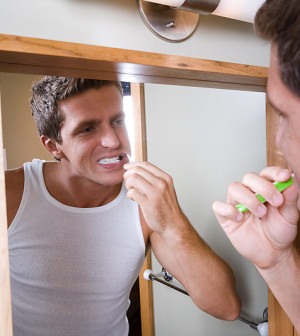- The Best Time of Day to Drink Bone Broth to Maximize Health Benefits
- 8 Ways to Increase Dopamine Naturally
- 7 Best Breads for Maintaining Stable Blood Sugar
- Gelatin vs. Collagen: Which is Best for Skin, Nails, and Joints?
- The Long-Term Effects of Daily Turmeric Supplements on Liver Health
- Could Your Grocery Store Meat Be Causing Recurring UTIs?
- Are You Making This Expensive Thermostat Error This Winter?
- Recognizing the Signs of Hypothyroidism
- 10 Strategies to Overcome Insomnia
- Could Artificial Sweeteners Be Aging the Brain Faster?
Placenta Might Have Its Own Helpful Bacteria


How newborns receive the colonies of helpful bacteria that reside in all people and make human life possible has been a mystery.
A new study suggests that the placenta — long thought a sterile environment — actually contains a small but diverse bacterial community (a “microbiome”) that might serve a crucial role in preparing newborns for life outside the womb.
“We hypothesize it’s the first feeding of the infant’s microbiome,” said lead author Dr. Kjersti Aagaard, an associate professor of obstetrics and gynecology at Baylor College of Medicine in Houston. “The different bacteria that we observed in the placenta are the same bacteria we see in the infant in the first week of life.”
The bacteria in the placenta most closely resemble the bacteria that normally reside in a person’s mouth, the researchers noted.
That could mean that a mother’s oral health is even more important to the health of her unborn child than previously thought, said Dr. Jacques Moritz, director of gynecology at Mount Sinai St. Luke’s in New York City. Moritz was not involved with the study.
“Possibly people with gum disease have more pockets of this bacteria and are chronically overloading the body with bacteria,” Moritz said. “That bacteria could concentrate in the placenta and cause premature delivery.”
The new research, published May 21 in Science Translational Medicine, did find that the bacteria in the placenta differs between premature and normal births. However, Aagaard was quick to note that her study does not establish a cause-and-effect relationship between those differences and premature delivery.
“The placenta has a unique community profile depending on when the infant is delivered,” she said. “All we can tell you is they’re different, and that’s an important thing to point out.”
Bacteria thrive throughout the human body, supporting functions such as digestion and immune response that are essential to life. These microbes outnumber the body’s cells 10 to 1, according to the U.S. National Institutes of Health.
Aagaard and her colleagues studied samples from more than 300 placentas to see whether babies might receive their first dose of life-sustaining bacteria from this crucial organ. The placenta connects a developing fetus to the uterus, allowing the unborn child to receive nutrients from its mother.
The investigators found a very sparse bacterial community in the placenta, much less dense than the bacteria that populate a person’s gut.
“For every pound of placenta, you get one gram of bacterial DNA,” Aagaard said. “It’s tiny, but you can measure it and it changes over time.”
Aagaard suspects this placental bacteria likely provides a baby with its first “seeding” of healthy microbes, as opposed to the widely held theory that newborns receive their initial dose of bacteria from the mother’s vagina during delivery.
“As a clinician, that explanation really doesn’t make any sense,” she said.
Closely examining the types of bacteria found in the placenta, the researchers concluded they are most similar to the mouth’s microbial community.
The study authors believe that bacteria from the mouth make their way to the placenta through the bloodstream, a hypothesis Moritz agrees with.
“Every time you brush your teeth, bacteria are entering your bloodstream and they go everywhere,” he said. “It’s usually cleansed by the body, but when it’s not you can end up with bacterial infections.”
Moritz considers oral health a key to a healthy pregnancy.
“I send all my patients for dental cleaning at 20-some weeks, just to make sure there are no pockets of bacteria that can cause premature labor,” he said.
Aagaard and her colleagues plan to explore the connection between oral and placental bacteria in a follow-up study involving more than 500 women at risk for preterm birth.
More information
To learn more about healthy human bacteria, visit the U.S. National Institutes of Health.
Source: HealthDay
Copyright © 2026 HealthDay. All rights reserved.










